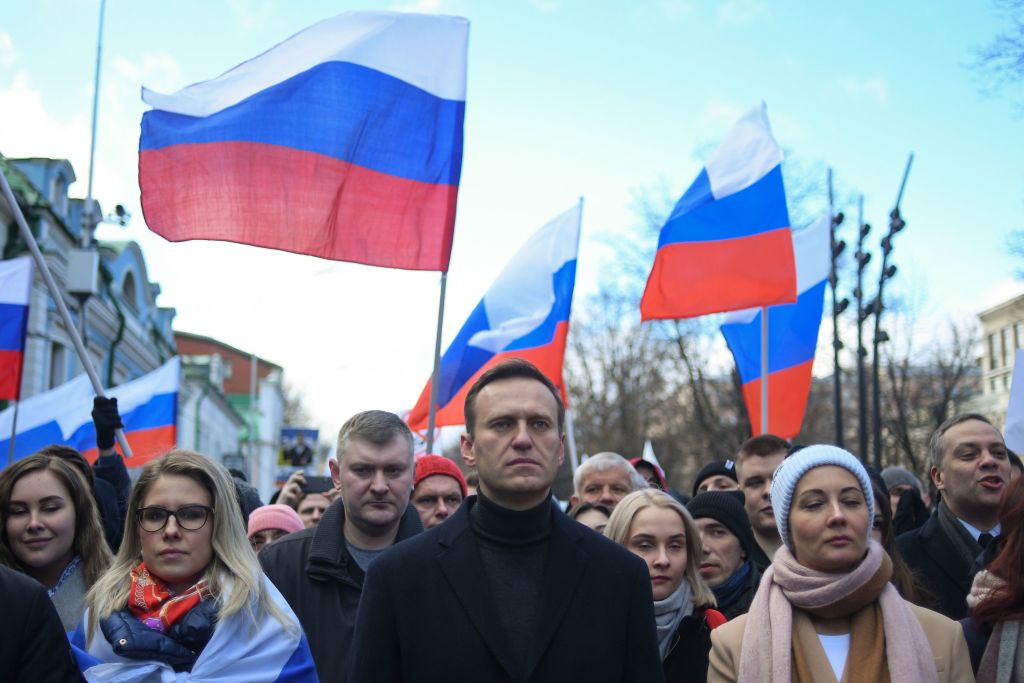The man with no name is now a prisoner with a number. Alexei Navalny, the Russian opposition leader poisoned by security officers back in August, flew back to Moscow yesterday and was promptly arrested. Whether this is symbolic catch-and-release or a sign that the Kremlin plans to bury him – literally or metaphorically – in its prison system remains to be seen.
The Kremlin certainly did everything they could to prevent his return being a media event. He was due to arrive at Moscow’s Vnukovo airport, where a crowd of journalists, supporters and riot police jostled in anticipation. So too did a rent-a-mob of supposed fans of a Russian media personality who, judging by her Instagram feed, wasn’t expecting this kind of reception. Anything to muddy the waters.
Even so, this was a feint. At the last minute, a ‘technical problem’ with the airport’s snow-ploughs was announced and Navalny’s flight was diverted to Moscow’s Sheremetyevo airport, a fair way to the north of Vnukovo. Just in case, the authorities also closed the Leningradskoye Highway leading to Sheremetevo. Navalny was detained at passport control and is arraigned for trial on the 29th.
The more the Kremlin feels it has to carry out such subterfuges, and the more it bears down on Navalny – who was arrested on the grounds that he failed to observe his probation terms for a past drummed-up charge while he was convalescing in Germany – then the more threadbare its claims that he is an inconsequential figure sound.
We should not overstate his appeal: even after the poisoning, many Russians do not know who he is, and many others still parrot the talking points of the government’s TV mouthpieces: that he is an opportunist or a foreign catspaw, and that he staged the poisoning as a publicity stunt.
Nonetheless, that the man whom Vladimir Putin cannot bring himself to name – he is everything from ‘the patient in Berlin’ to ‘that individual whom you mentioned’ – has, despite being for a long time virtually taboo on TV, managed to make such inroads, is a triumph in itself. On social media, in street protests, through YouTube videos highlighting official corruption that manage to be both funny and forensic, Navalny has taken his message about the hypocrisy and venality of the Putin regime and built a political platform around it.
For a long time he was tolerated to a degree, as much as anything else as a token gesture towards the democratic politics the regime claimed to espouse. When Navalny wanted to stand against Sergei Sobyanin in Moscow’s mayoral elections, it was Sobyanin who argued that he be allowed to run. He knew that if he beat Navalny rather than just the colourless stand-ins from the fake opposition parties, it would give him a legitimacy no mock election could provide.
But Navalny began to become more dangerous just as Putin’s appetite for risk was waning. His ‘smart voting’ initiative, which encouraged tactical voting against whoever – independent, Communist, nationalist – was best placed to unseat the Kremlin’s United Russia bloc candidate was as dangerous as it was simple. With parliamentary elections looming in the autumn, something had to be done, and that something was an attempted assassination.
He could have been granted asylum and no doubt comfortable fellowships or directorships anywhere he wanted. Yet he came back, and in an impromptu press conference on arrival said that while Germany is an excellent country, this was his happiest day in the last five months.
This is both bravery of the highest order and also shrewd political calculation. He could not be a real force in Russian politics, let alone in effect the leader of the opposition to Putin, from comfortable exile. He has demonstrated a willingness to stand up to a regime which tried to kill him. If he survives, the moral authority he gains cannot be denied. If, God forbids, he doesn’t, then he is another in Russia’s bright red line of martyrs. If they let him go, he is back in business. If not, then the Kremlin has shown that for all its pretence of disinterest, it fears the man with no name.







Comments